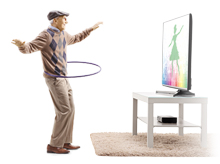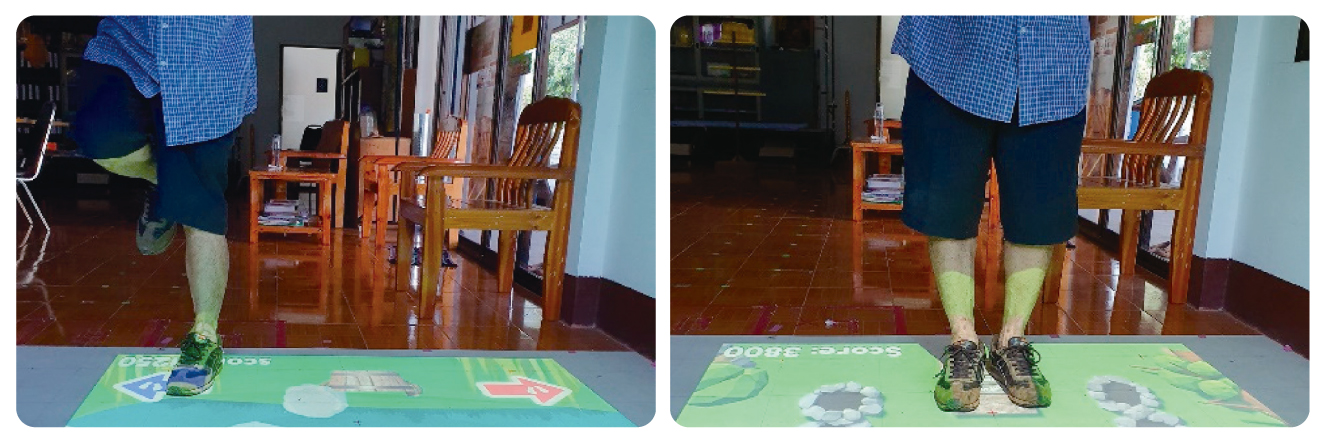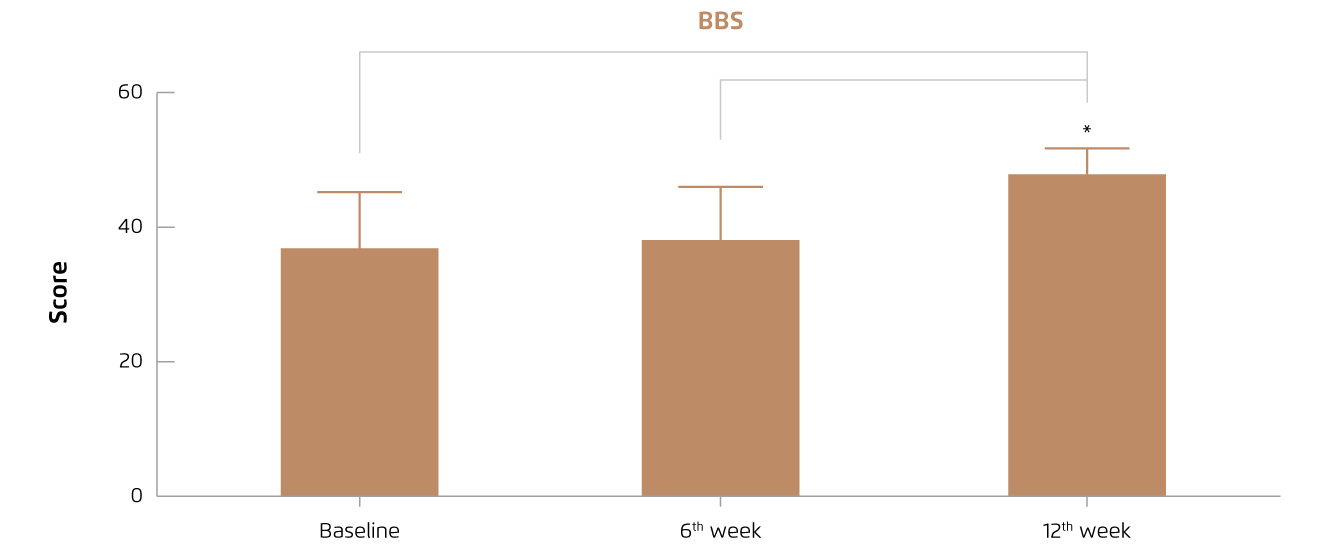
Game-based Exercise for Fall Prevention in Elderly
Falls and instability are common clinical problems among elderly leading to devastating consequences including morbidity, premature mortality and extra burden on healthcare services. In Hong Kong, the reported prevalence of having at least one fall in the preceding 12 months in elderly was between 18-19.3%, with 75.2% sustaining injuries and 7.2% having a serious injury1. Apart from treating the injuries, the underlying risk factors of fall is usually unaware in the clinical management of falls. Hence, recurrence of falls is possible unless the risk factors are addressed. With the increasing popularity of interactive video games, the potential benefits of game-based exercise on overall wellbeing including fall prevention in elderly have received increasing attention.
Risk Factors for Fall in Elderly
There are many population-based studies evaluated the prevalence of falls among elderly. However, the actual number of fall are likely under-reported because of the elderly’s fear of being hospitalised following a fall. In the case of older people with cognitive impairment, the fall cases might be forgotten without reporting to the healthcare professionals1. Of note, the problem of falls among elderly is not entirely reflected by the high prevalence as the issue is complicated by a wide spectrum of disease conditions. For instance, the occurrence of osteoporosis and age-related physiological changes, such as slowed protective reflexes, would make a mild fall dangerous. In addition to physical traumas, post-fall anxiety syndrome is common as well. Moreover, the recovery from fall injury in elderly is often delayed that would increase risk of subsequent falls due to deconditioning2. Thus, addressing the underlying risk factors for fall among elderly is essential in fall management.
Falls are multifactorial events caused by various extrinsic and intrinsic factors. Former investigations suggested that most falls can be attributed to the physical changes inherent in the aging process. A local case-control study by Lee et al (2016) including records of 340 local people aged 65 or above demonstrated that increased risk of falls resulting in hip fracture was significantly associated with benign prostatic hyperplasia, use of first-generation antihistamines and anti-Parkinson medications, osteoporosis, and use of walking aids3. Besides, a recent systematic review by Peng et al (2019) reported that visual impairment, orthostatic hypotension, urinary incontinence, osteoporosis and depression were associated with increased risk of fall-related injury4.
Particularly, people with cognitive impairment are at increased risk of fall. Zhang et al (2019) highlighted that comorbidity and interaction between gait abnormality and cognitive impairment may underpin the high prevalence of falls in older adults with dementia. Attention, sensory integration, and motor planning are the cognitive function associated with risk of falls through gait dysfunction, whereas cognitive flexibility, judgement, and inhibitory control affect risk of falls through risk-taking behaviour5. Thus, former opinions advocated that clinical assessments including gait, cognitive and physical performance can be applied to estimate the risk of fall and should be integrated in fall management2,5,6.
Reducing Fall Risk with Game-based Exercises
While age-related physical and cognitive declines are reported to increase the risk of falls in elderly population, physical exercises, particularly those with balance training, are reported to be effective fall prevention strategy for older people7. Further, there are emerging evidence suggesting cognitive training can positively impact executive and motor control functions such as walking gait, and hence reduce fall risk8.
The development in virtual reality (VR) technology in recent years allows users to interact with virtual objects and events that simulate the real world, whereas the VR technology has been introduced into video games. Although these VR applications were developed primarily for entertainment purposes, they have evolved as a mean to encourage fitness exercise, known as exergames, in the general population9, especially during the current COVID-19 pandemic. This triggers the interest of researchers in implementing physical and cognitive training for elderly through game-based exercises.
In a clinical trial by Phirom et al (2020), 40 adults aged ≥65 were randomly assigned to participate in game-based exercise (n = 20, intervention group, 1 hour/session, 3 sessions/week for 12 weeks, Figure 1) or control group (n= 20). Fall risk and cognitive outcome were assessed and compared pre- and post-intervention. The results indicated that participants in intervention group demonstrated significant improvement in fall risk score (p = 0.015), postural sway (p = 0.005), cognitive performance reflected by Montreal Cognitive Assessment score (p = 0.001), and Timed Up and Go (TUG)-dual task (p = 0.045) as compared to control group10. Thus, the results suggested that the interactive game-based exercise is effective in improving physical and cognitive performance in elderly and reducing the risk of fall.

Figure 1. Game-based exercise training for elderly10
On the other hand, Yuan et al (2020) investigated the impact of game-based exercise on balance in elderly with mild-to-moderate Parkinson’s disease (PD). In the crossover trial, 24 PD patients, aged ≥65, were randomly allocated into Group A (6 weeks of game-based exercise followed by 6 weeks of control period with no exercise) or Group B (6 weeks of control period followed by 6 weeks of game-based exercise). Assessments were performed at baseline, after the 6th week and after the 12th week. The results demonstrated that 6 weeks of game-based exercise significantly improved balance ability (indicated by Berg Balance Scale [BBS], Figure 2), postural stability (indicated by Multi-Directional Reach Test) and confidence in preventing falls (indicated by Modified Falls Efficacy Scale) in older adults with mild-to-moderate PD11.

Figure 2. Changes in Berg Balance Scale in Group B11
In order to generate the optimal outcomes of exercise training on preventing falls, sustainable training performed by the elderly is preferred. Nonetheless, older people, in fact younger people as well, seldom participate in repetitive, uninviting, or difficult exercises. Thus, easy and interesting game-based exercises would provide the participants not only health benefits, but also enjoyment and hence encourage compliance.
Play Responsibly
There are emerging clinical data suggesting that game-based exercises may serve as an alternative to traditional exercise training for elderly people to improve their physical and cognitive performance. In addition, former reports suggested that game-based intervention would be beneficial for the mental health of elderly as well12. However, it is important to realise the potential drawback of game-based exercise in implementing the intervention. For instance, it has been reported that the prevalence of gaming addiction was 10.1% in Southeast Asia, whereas adults have a higher tendency of gaming disorder as compared to youngsters13. Nonetheless, an appropriate amount of well-designed, interesting game-based exercise is expected to be helpful in promoting overall health and emotion of elderly.
References
1. Luk et al. Hong Kong Med J 2015; 21: 165-71. 2. Rubenstein. Age and Ageing. 2006. DOI:10.1093/ageing/afl084. 3. Lee et al. Am J Ther 2016; 23: e1729-35. 4. Peng et al. Inj Prev 2019; 25: 4-12. 5. Zhang et al. Dement Geriatr Cogn Disord 2019; 48: 17-29. 6. Nascimento et al. Geriatr Gerontol Aging 2018; 12: 219-24. 7. Sherrington et al. Br J Sports Med 2017; 51: 1750-8. 8. Robinson and Kiely. Cogent Psychol 2017; 4: 1405866. 9. Owen et al. J Strength Cond Res 2011; 25: 3191-7. 10. Phirom et al. Int J Environ Res Public Health 2020; 17: 1-12. 11. Yuan et al. J Neuro Engineering Rehabil 2020 171 2020; 17: 1-10. 12. Xu et al. Games Health J 2020; 9: 389-404. 13. Chia et al. Int J Environ Res Public Health 2020; 17. DOI:10.3390/IJERPH17072582.





